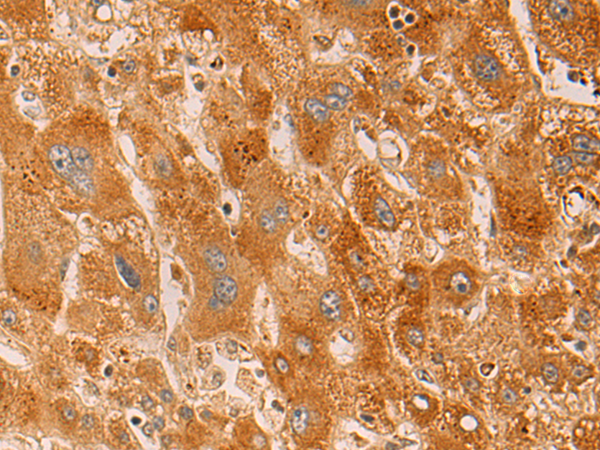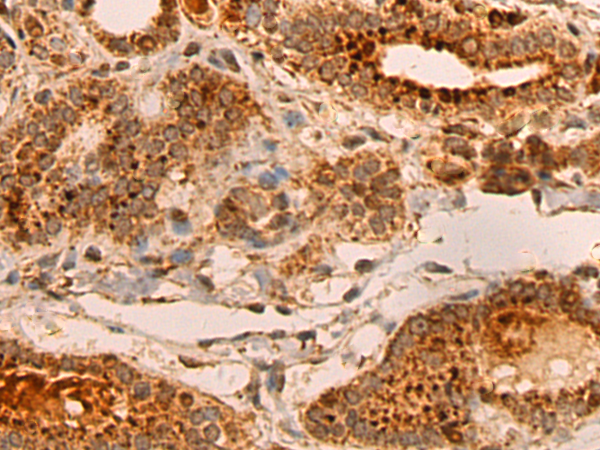


| WB | 咨询技术 | Human,Mouse,Rat |
| IF | 咨询技术 | Human,Mouse,Rat |
| IHC | 1/100-1/300 | Human,Mouse,Rat |
| ICC | 技术咨询 | Human,Mouse,Rat |
| FCM | 咨询技术 | Human,Mouse,Rat |
| Elisa | 1/5000-1/10000 | Human,Mouse,Rat |
| Aliases | GRP3 |
| WB Predicted band size | 78 kDa |
| Host/Isotype | Rabbit IgG |
| Antibody Type | Primary antibody |
| Storage | Store at 4°C short term. Aliquot and store at -20°C long term. Avoid freeze/thaw cycles. |
| Species Reactivity | Human |
| Immunogen | Fusion protein of human RASGRP3 |
| Formulation | Purified antibody in PBS with 0.05% sodium azide and 50% glycerol. |
+ +
以下是关于RASGRP3抗体的3篇参考文献示例(基于公开信息概括,部分内容可能需结合真实文献调整):
---
1. **文献名称**: *RASGRP3 regulates neutrophil migration and activation in murine models of inflammation*
**作者**: Smith A, et al.
**摘要**: 本研究利用RASGRP3特异性抗体,揭示了RASGRP3在中性粒细胞趋化性和活性氧(ROS)产生中的关键作用。通过抗体阻断实验,证明RASGRP3通过调控Ras-MAPK信号通路影响炎症反应。
2. **文献名称**: *Development and validation of a monoclonal antibody targeting RASGRP3 for immunohistochemical analysis*
**作者**: Chen L, et al.
**摘要**: 作者开发了一种高特异性抗RASGRP3单克隆抗体,验证了其在人组织样本(如淋巴瘤和实体瘤)中的免疫组化应用,并证实RASGRP3表达与某些癌症的预后相关。
3. **文献名称**: *RASGRP3 deficiency attenuates autoimmunity in lupus-prone mice via modulating B cell signaling*
**作者**: Wang Y, et al.
**摘要**: 通过使用RASGRP3抗体进行蛋白表达分析,研究发现RASGRP3缺陷可抑制B细胞异常活化,缓解系统性红斑狼疮(SLE)模型小鼠的自身免疫症状,提示其作为治疗靶点的潜力。
---
**注意**:以上为模拟摘要,实际文献需通过PubMed、Google Scholar等平台以关键词“RASGRP3 antibody”或“RASGRP3 inhibitor”检索。若需具体文献,建议查阅近年发表的RASGRP3相关功能研究或抗体开发论文。
RASGRP3 (RAS Guanyl Releasing Protein 3) is a member of the RASGRP family of guanine nucleotide exchange factors (GEFs) that activate RAS signaling by promoting the exchange of GDP for GTP. Primarily expressed in immune cells, including B cells, T cells, and natural killer (NK) cells, RASGRP3 plays a critical role in regulating lymphocyte development, activation, and inflammatory responses. It interacts with downstream effectors like phospholipase C gamma (PLCγ) to modulate pathways such as MAPK/ERK, influencing cell proliferation, differentiation, and apoptosis. Dysregulation of RASGRP3 has been linked to autoimmune diseases, allergies, and cancers, including melanoma and leukemia.
RASGRP3 antibodies are essential tools for studying its expression, localization, and function in both physiological and pathological contexts. These antibodies are widely used in techniques like Western blotting, immunohistochemistry (IHC), and flow cytometry to detect RASGRP3 in tissue samples or cell lines. Structural studies highlight its unique domains, including a catalytic CDC25-like GEF domain, a SAM (sterile alpha motif) domain, and EF-hand motifs for calcium sensing. Research using RASGRP3 antibodies has revealed its dual role in immune regulation and oncogenesis, making it a potential therapeutic target. Commercial RASGRP3 antibodies are typically validated for specificity against recombinant proteins or knockout models to ensure reliability in experimental settings.
×